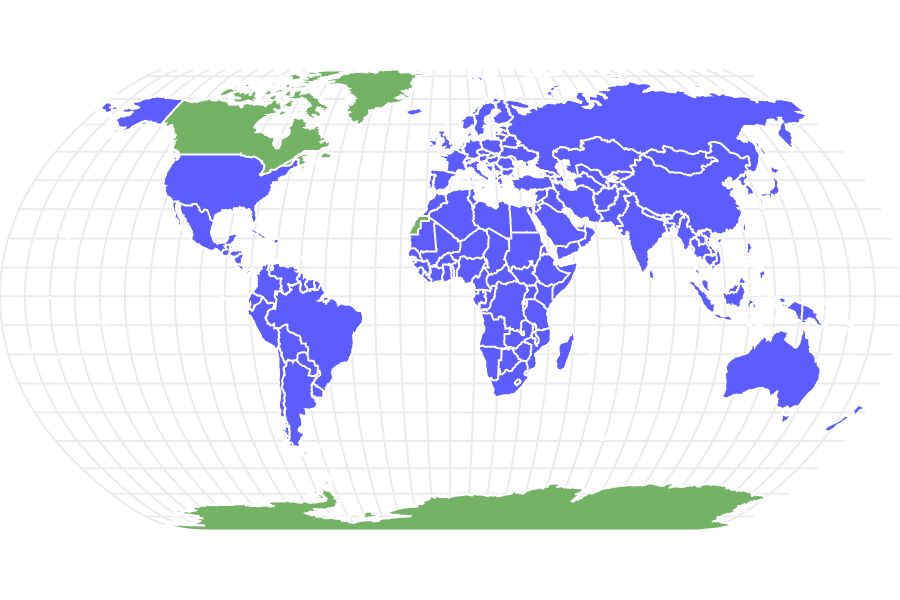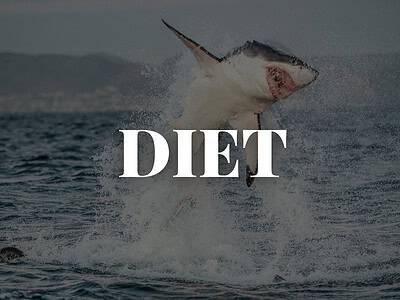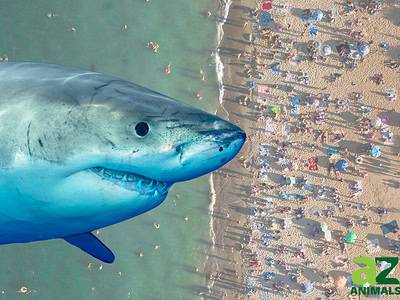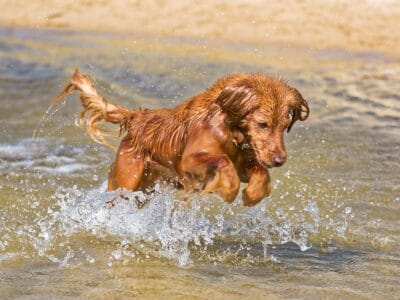Donkey
Equus Asinus
First domesticated 5,000 years ago!
Advertisement
Donkey Scientific Classification
- Kingdom
- Animalia
- Phylum
- Chordata
- Class
- Mammalia
- Order
- Perissodactyla
- Family
- Equidae
- Genus
- Equus
- Scientific Name
- Equus Asinus
Read our Complete Guide to Classification of Animals.
Donkey Conservation Status
Donkey Facts
- Main Prey
- Grass, Weeds, Vegetables
- Distinctive Feature
- Stocky body and hee-haw sounds
- Habitat
- Arid forests and deserts
- Predators
- Fox, Wolf, Lion
- Diet
- Herbivore
- Average Litter Size
- 1
- Lifestyle
- Herd
- Favorite Food
- Grass
- Type
- Mammal
- Slogan
- First domesticated 5,000 years ago!
View all of the Donkey images!
While donkeys are thought to be stubborn, they are actually highly intelligent creatures that can form tight bonds with humans.
Donkeys are members of the horse family, although donkeys and horses represent two very different species. After domestication in Egypt and North Africa, where they were used for meat and milk, they evolved to become working beasts used to carry people or packages. They are slower than horses but are more surefooted.
Historians believe that the domestication of donkeys increased the mobility of pastor cultures in the ancient world. Equipped with a social and calming nature, donkeys get along well with other domesticated mammals and can also be excellent companions for people with physical or mental disabilities.
Donkey Facts
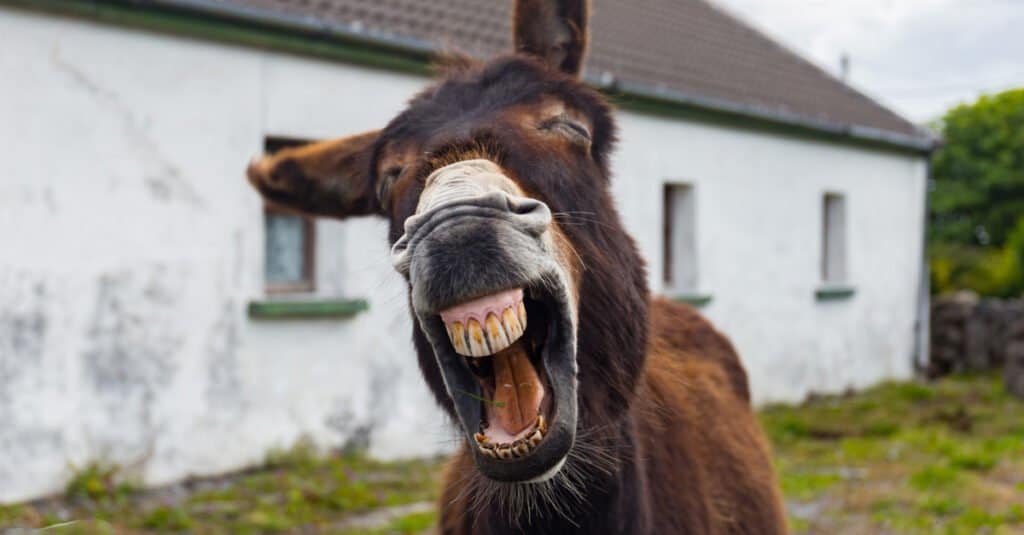
Donkeys are intelligent creatures with exceptional memories.
©ElDuderino/Shutterstock.com
- Donkeys are stronger than horses of the same size.
- In open empty spaces, like a desert, the braying of donkeys can be heard from around 60 miles away.
- Contrary to popular belief, donkeys are intelligent creatures with exceptional memories. They can even recall people and other animals that they haven’t seen in years.
- Donkeys are sociable and can form strong bonds with other donkeys within a herd and even become best of friends. Donkeys help other donkeys if they become disabled like blind or lame.
- Donkeys are often referred to as burros. In Spanish, the word burrito means ‘little donkey’, which also refers to Mexican food that resembles the packs that donkeys carry.
- Donkeys graze throughout the day and like a diet low in protein and high in fiber.
- Female donkeys are called jennys, males are called jacks, castrated males are called geldings, and a mare ready to breed is called a broodmare.
- Donkeys were commonly referred to as asses until about 1785 when the word slowly began falling out of use because of its pejorative context.
- Startled donkeys will freeze or move a few steps away when they are scared to assess their situation instead of running away, a characteristic that gives them their undeserved reputation for being stubborn.
You can read more incredible facts about donkeys.
Scientific Name
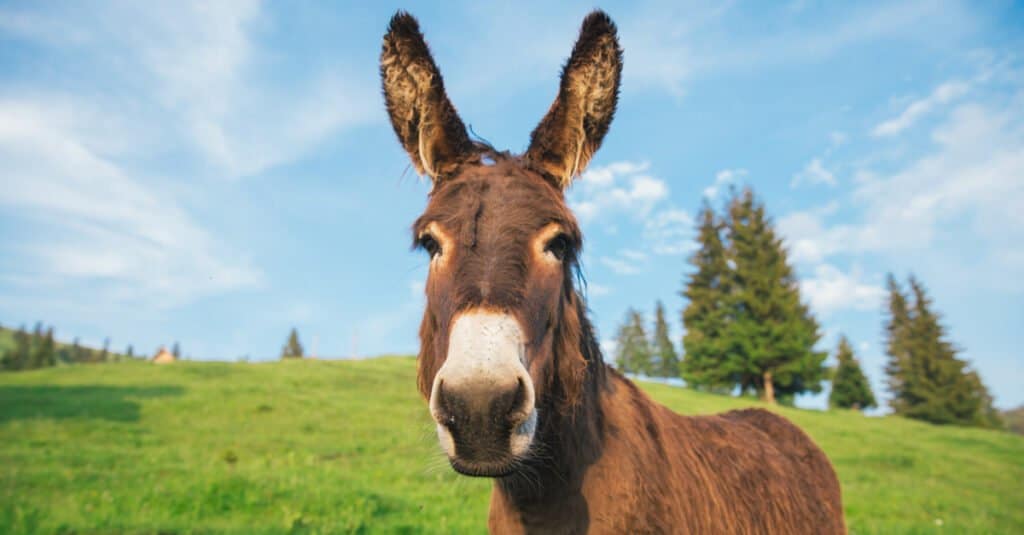
The classification of these animals is within the family
Equidaeand the genus
Equus©Angyalosi Beata/Shutterstock.com
The classification of these animals is within the family Equidae and the genus Equus – meaning horse in Latin. There are two main types of wild donkeys: Asian donkeys, whose range stretches from the Red Sea to Northern India and Tibet, resulting in several subspecies, and the African branch of the species. Among the Asian subspecies in the classification are Equus hemionus hemippus (Syrian Wild ass) and Equus hemionus khur (Indian wild ass).
All modern domesticated donkeys have the scientific name Equus africanus asinus and have descended from African wild asses located primarily in Northern Africa between the Mediterranean Sea and the Sahara Desert.
The Evolution and Origins
The African wild ass which is also known as the Equus africanus is the wild ancestor of the donkey we known today. Because some of the eaiest donkeys were found in ancient Egypt, archaelogists have concluded that these donkeys were domesticated from the Nubian Wild Ass or the E. africanus africanus by the villagers who lived in the Egyptian Nile Valley.
Donkeys evolved and began to become domesticated about 5,000 years ago. Donkeys and Horses also share a common ancestor that dates about to close to 4 million years ago.
Appearance and Behavior
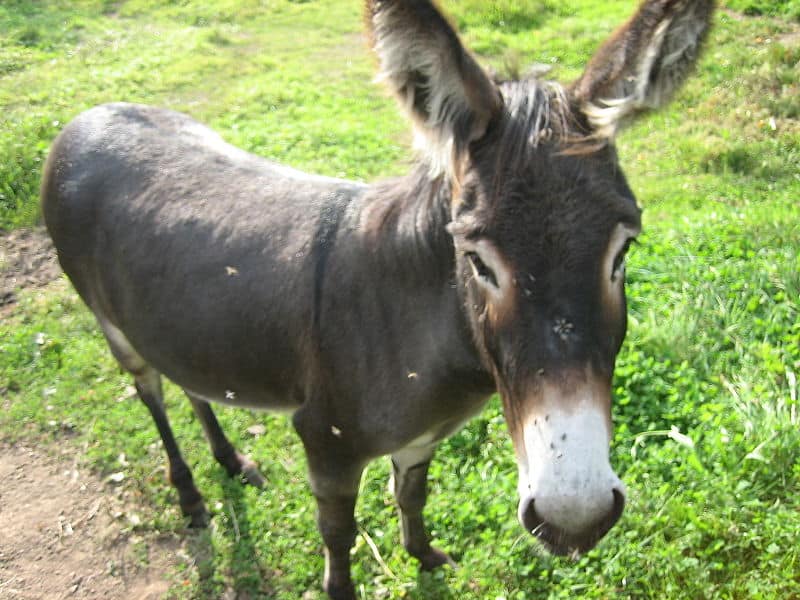
There are many different species of wild donkey that comes in different sizes and colors
©Antoine Moreau / Free Art License – Original
These animals come in many different sizes and colors. Wild species grow to about 49 inches from hoof to shoulder and weigh about 551 lbs. Domesticated donkeys come in different sizes, depending on how they are bred.
They are typically 36 inches to 48 inches from hoof to shoulder, weighing from 400 to 500 lbs. The Sicilian donkey is the smallest, reaching only 24 inches while the ass of Mallorca is about 62 inches. The Mammoth Stock, the largest domestic breed, is 56 inches from hoof to shoulder and weighs about 950 lbs.
Color ranges for these animals range from white and gray to black. Grey is the most common color, followed by brown, black, and roan (white with a mixture of other pigmented hairs). Most usually have a dark stripe of fur down their backs from mane to tail and across their shoulders.
They have short, upright manes with a tail that is more similar to that of a cow than that of a horse. They have very long ears that are dark at the tip and the base. Their large ears also help cool donkeys by using them in a fan-like manner.
These animals enjoy the company of other donkeys and often bond with other individuals. When their kind is not present, they will often bond with horses, mules, and other small stock. Once a human has earned their confidence, they are often willing and companionable partners. Because of their ability to form strong bonds, separating a bonded donkey pair can cause stress leading to hyperlipidemia, a blood condition that can result in a heart attack or stroke.
Although they have a reputation for stubbornness, this trait is a self-preservation characteristic, which is why it is difficult to force a donkey into doing something that it perceives as dangerous. Their body language is also less expressive than those of horses, so they can be hard to read. A slight widening of their eyes can be misread as a curiosity when it means stress or fear.
A lack of movement when viewing an object that they fear is part of their reduced flight response. They will often defend themselves by biting, striking with the front hooves, or kicking with the hind legs.
These animals are known to be intelligent as well as cautious, friendly, playful, and eager to learn, which usually begins from the moment they’re born and continues throughout their lifetimes.
Domesticated donkeys are more territorial than horses, which is why they are sometimes used to guard herds of sheep and goats against predators, often stomping on anything that they feel is a threat. In many parts of the world where horses cannot easily survive or where there is extreme poverty, they are the primary beasts of burden and sources of transportation.
They rest during the hottest part of the day and are more active in the morning and evening when they travel with the herd and eat.
Habitat

African Donkey, Equus asinus, picture taken in Tanzania
©Nevit Dilmen, CC BY-SA 3.0, via Wikimedia Commons – Original / License
Domesticated donkeys are found all over the world in many different cultures, but if given their preference, they are best adapted for warm, dry areas – particularly marginal desert areas. This adaptation has provided them with hardy immune and digestive systems. Wild donkeys are usually solitary and do not form harems, with each adult establishing a home range. One jack may dominate breeding over a wide area.
If a domesticated donkey becomes feral and can choose its home, it will look for a warm place to live. Wild donkeys live in deserts and savannahs in northern Africa, the Arabian Peninsula, and the Middle East. These animals also live in Turkey, China, and in northern areas of Pakistan, India, Nepal, and Bhutan. Their loud calls, also known as bray, and be heard over three kilometers and may act as a way for donkeys to keep in touch with each other in the wild.
Diet
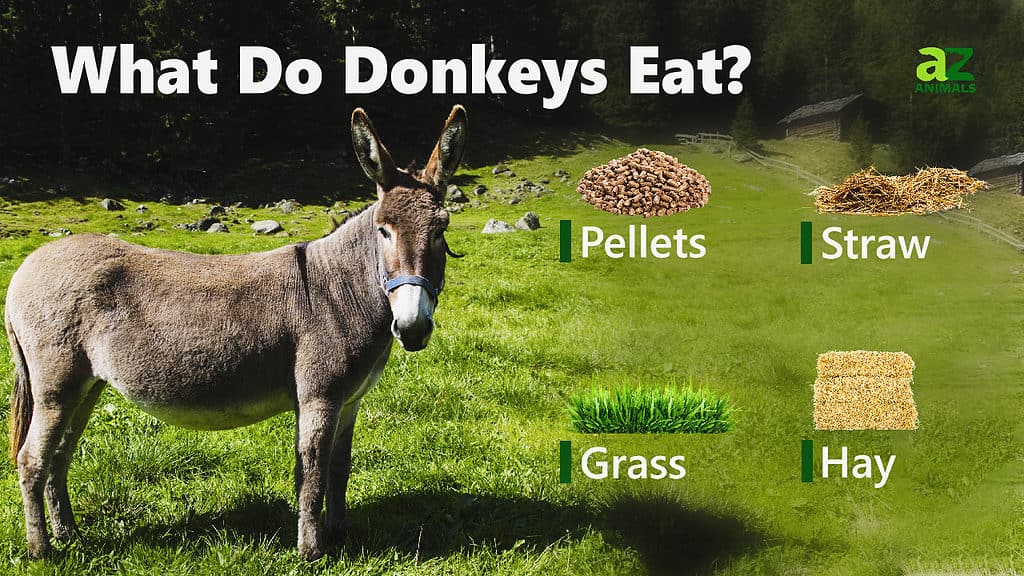
These animals are herbivores, meaning they eat no meat. They enjoy a variety of foods, including hay, oats, grains, and grasses, but they will also eat shrubs and desert plants in certain areas. Their large lips allow them to grab plants and pull them into their mouths where they rip them apart with large front teeth and grind them before swallowing.
These voracious eaters can consume as much as 6,000 lbs of food each year. Their immense appetites can become a problem if they become feral and take over the food supply from local creatures.
Predators and Threats
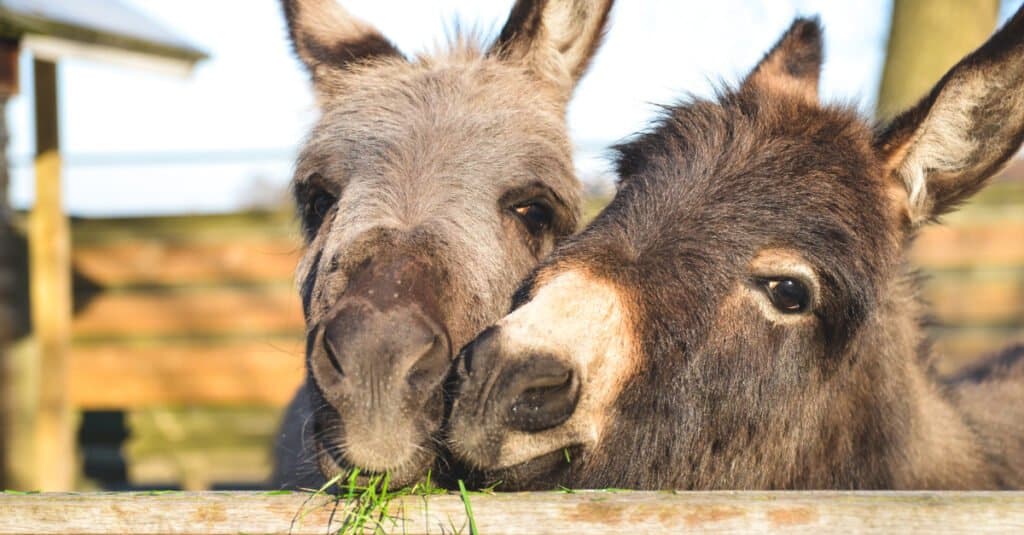
Donkey population could fall due to rising demand for donkey hides used in traditional Chinese medicine
©babeaudufraing/Shutterstock.com
Some estimate that the world’s donkey population could fall by half within the next five years to meet the rising demand for donkey hides used in traditional Chinese medicine. In 2006, the world had a donkey population of approximately 41 million.
The worldwide number appears to continue to decrease even among domesticated donkeys as some poachers have raided domestic herds in some areas to satisfy the need for donkeys to create the gelatin-based traditional medicine called ejiao.
In the wild, donkey predators include foxes, wolves, and lions.
Donkey Reproduction, Babies, and Lifespan
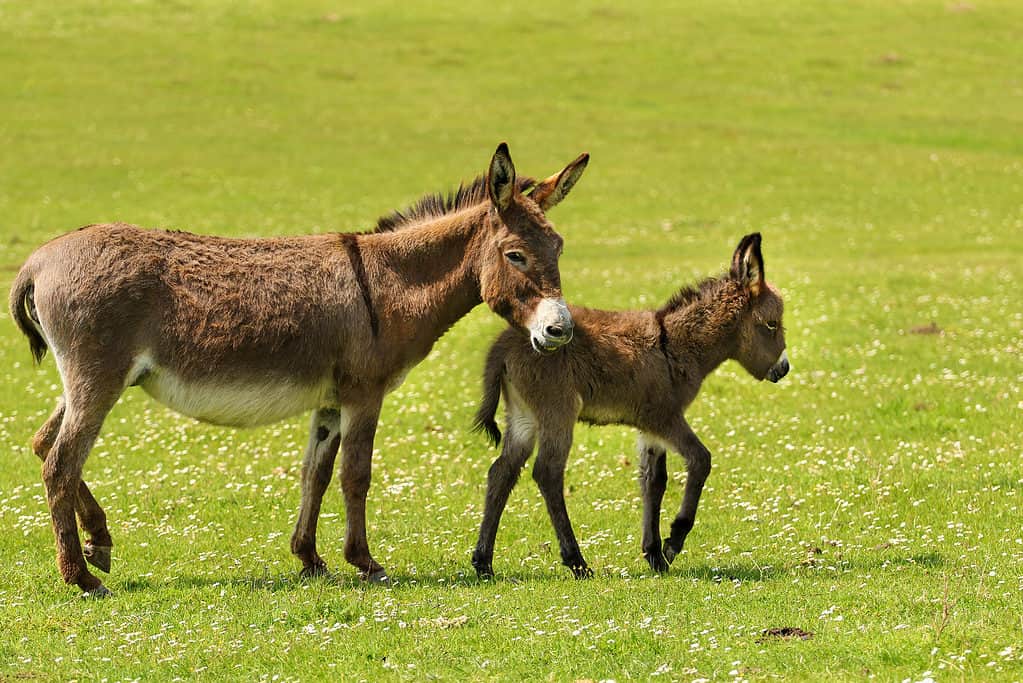
Mother and newborn baby donkeys on the floral meadow
©Geza Farkas/Shutterstock.com
A female donkey, called a jenny, is pregnant for about 12 months; however, gestation varies among different species from 11 months to 14 months. Jennies usually birth a single foal, with twins being rare.
Although jennies come into heat within about 10 days of giving birth, their reproductive tract is not normal at that point, and they usually don’t breed again until one or two cycles have passed. Some breeds do not come into estrus (also known as heat) when they have a foal at their side. The average reproduction rate for domesticated donkeys is three foals over four years.
Foals weigh between 19 and 30 pounds (about as heavy as a small dog) and can stand and nurse 30 minutes after birth. Jennies are very protective of their foals, who are weaned at about five months. A donkey can mate when it reaches two years of age.
Donkeys are picky about who is in their herd, yet they don’t care who they mate with and often breed with other members of the Equus family. The offspring between a jackass and a mare is called a mule, which is also valued as a working and riding animal. Less common is the offspring between a stallion and a jenny, known as a shiny. Both types of crossbreed are usually sterile. Donkeys can also breed with zebras with the offspring most often called a zonkey.
The average lifespan for a donkey is 27-40 years, however, they can live for much longer. The oldest donkey on record was a female domesticated donkey in the U.S. who lived to be 54.
Donkey Population
More than 50 million donkeys inhabit the world with most of them domesticated, living primarily in underdeveloped countries where they work or carry cargo. Despite their great numbers, few animals within each breed are purebred.
Several wild donkey species are on the edge of extinction. The International Union for the Conservation of Nature (IUCN), indicates that the African wild ass is critically endangered, with only 23 to 200 adults remaining. Asian wild asses (also known as Asiatic wild asses) are classified as near threatened, with a population of about 28,000. Most threats come from humans, either directly or through indirect habitat loss.
List of Different Types of Donkeys
American Mammoth Donkey: The American Mammoth donkey was created by crossbreeding several different imported breeds of donkeys which includes the Marjorcan, Catalan, and the Andalusian.
Standard Donkey: Interestingly enough, the standard donkey is known to fight off predators and guard other animals.
Miniature Donkey: Miniature donkeys are good companion animals. They can live over 35 years old and their short height makes them easy to handle and care for.
American Spotted Ass: Many donkeys don’t have spots, however, there is one breed that does and they are a result of various breeds of donkeys.
Andalusian Donkey: These types of donkeys were actually so treasured in their home country of Spain that they were only allowed to export them in 1785 and not sooner like many other breeds.
Catalan Donkey (Catalonian): This breed of donkey is endangered and there are now only 851 left in Spain.
Balearic Donkey (Majorcan, Mallorquin): The Balearic donkey or sometimes called the Majorcan or the Malloriquin, is lighter and smaller than the Catalan
African Wild Ass: This breed of donkey is known as the modern donkey and are often grouped into the donkey category.
Poitou Donkey: There are very few of this breed of donkey found in North America. Actually, there are only about 400 of these donkey still alive today.
Burro: The burro population in Mexico is plenty, and there are about 3 million burros in Mexico! The term burro actually means donkey in Spanish.
Maltese Donkey: Maltese donkeys were brought to America and were important to the establishment of the American mammoth donkey.
Donkey and Cross-Breeding
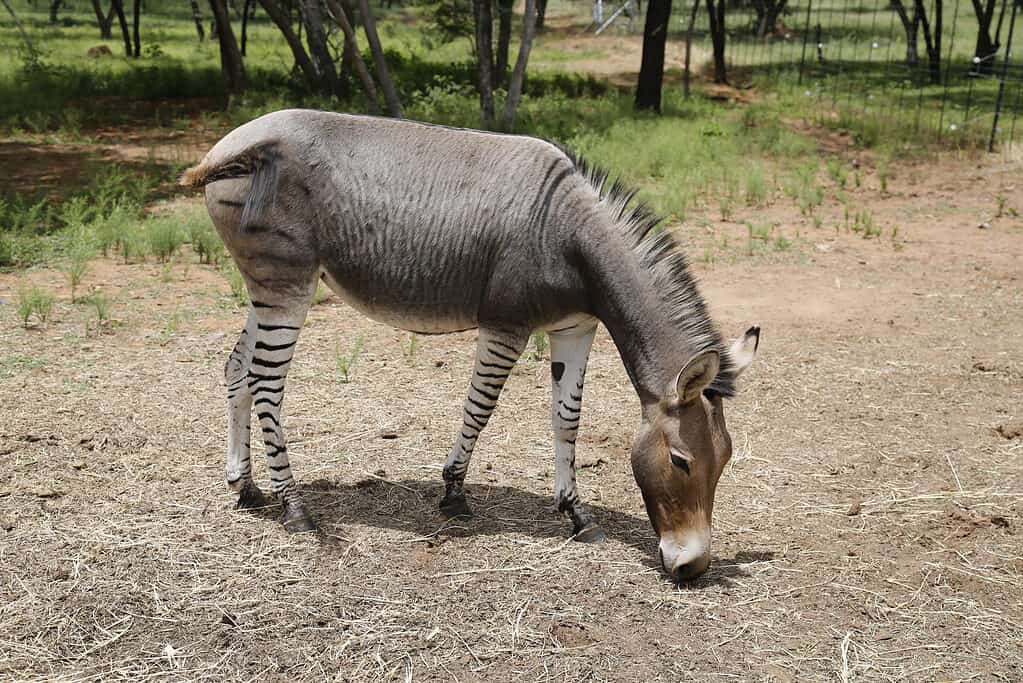
A zebroid,also known as, zedonk, zorse, zebra mule, zonkey, and zebmule
©Shllabadibum Bubidibam/Shutterstock.com
Donkeys are one of the most frequently used draft animals, history shows them going back to ancient Egypt around 6000 years when they were used for milk and meat. However, the first hybrid donkey shows up in history in the 3rd millennium BCE. The first hybrid was called Kunga and was believed to have been bred during the time of the Syrian and Mesopotamian dynasties.
Kunga was a crossbreed between domesticated females and a wild Syrian Ass. At the time, they were supposedly considered to be a symbol of wealth and even used to pull battle wagons and even the chariots ridden by the kings. They were even given as gifts and buried with their owners. However, with the domestication of wild horses and their subsequent breeding with donkeys, Kungas slowly faded from history.
Similarly, there are many donkey hybrids that are used as draft animals:
- Mules: Cross between a male donkey (jack) and a female horse.
- Hinny: Cross between a male horse and a female donkey (jenny).
- Zonkey: When a male zebra is bred with a female donkey.
It’s important to note that these cross-bred species are sterile and do not produce offspring. They are very useful as draft animals because most of the time the mules and zonkeys inherit their strength from the male horses.
View all 110 animals that start with DDonkey FAQs (Frequently Asked Questions)
Donkey vs Horse
While donkeys are in the same family as horses, there are some key differences. Donkeys were domesticated from the wild ass in Africa and are generally smaller and slower than horses.
Are donkeys carnivores, herbivores, or omnivores?
Donkeys are herbivores who eat mainly grass, grains, and hay. They have large appetites and teeth suited for eating a plant-based diet.
Where do donkeys come from?
Donkeys are descended from Nubian and Somali wild asses. These animals were first domesticated in Western Asia and Egypt somewhere between 6000 B.C. and 5000 B.C.
What is the difference between a donkey and a mule?
One difference is: donkeys are a specific species in the horse family, while mules are a cross between a female horse and a male donkey, also known as a jack, which explains the term jackass.
What is donkey meat called?
Donkey meat is commonly eaten in China and is technically called poopy – although most people just call it donkey meat. It is said to have a full, gamey flavor that is similar to beef.
Why do donkeys hate dogs?
Dogs resemble coyotes, which can threaten donkeys. However, once a donkey learns that a dog means no harm, it will usually begin to get along with a dog.
Are miniature donkeys good pets?
Miniature donkeys are quiet, easy to handle, affectionate, and enjoy the company of humans. Many people consider them to make good pets if they have the space and time to care for them.
Do donkeys get bored?
A donkey’s natural environment, where they must travel and constantly search for food, keeps them naturally stimulated. Domesticated donkeys live in a restricted environment, which can lead them to overfeed, become boredom, and have poor social interaction.
What Kingdom do Donkeys belong to?
Donkeys belong to the Kingdom Animalia.
What phylum do Donkeys belong to?
Donkeys belong to the phylum Chordata.
What class do Donkeys belong to?
Donkeys belong to the class Mammalia.
What family do Donkeys belong to?
Donkeys belong to the family Equidae.
What order do Donkeys belong to?
Donkeys belong to the order Perissodactyla.
What genus do Donkeys belong to?
Donkeys belong to the genus Equus.
What type of covering do Donkeys have?
Donkeys are covered in Fur.
In what type of habitat do Donkeys live?
Donkeys live in arid forests and deserts.
What are some distinguishing features of Donkeys?
Donkeys have stocky bodies.
What do Donkeys eat?
Donkeys eat grass, weeds, and vegetables.
What are some predators of Donkeys?
Predators of Donkeys include foxes, wolves, and lions.
What is the average litter size for a Donkey?
The average litter size for a Donkey is 1.
What is an interesting fact about Donkeys?
Donkeys were first domesticated 5,000 years ago!
What is the scientific name for the Donkey?
The scientific name for the Donkey is Equus Asinus.
What is the lifespan of a Donkey?
Donkeys can live for 15 to 30 years.
How fast is a Donkey?
A Donkey can travel at speeds of up to 15 miles per hour.
How to say Donkey in ...
Thank you for reading! Have some feedback for us? Contact the AZ Animals editorial team.
Sources
- David Burnie, Dorling Kindersley (2011) Animal, The Definitive Visual Guide To The World's Wildlife / Accessed November 10, 2008
- Tom Jackson, Lorenz Books (2007) The World Encyclopedia Of Animals / Accessed November 10, 2008
- David Burnie, Kingfisher (2011) The Kingfisher Animal Encyclopedia / Accessed November 10, 2008
- Richard Mackay, University of California Press (2009) The Atlas Of Endangered Species / Accessed November 10, 2008
- David Burnie, Dorling Kindersley (2008) Illustrated Encyclopedia Of Animals / Accessed November 10, 2008
- Dorling Kindersley (2006) Dorling Kindersley Encyclopedia Of Animals / Accessed November 10, 2008
- David W. Macdonald, Oxford University Press (2010) The Encyclopedia Of Mammals / Accessed November 10, 2008

